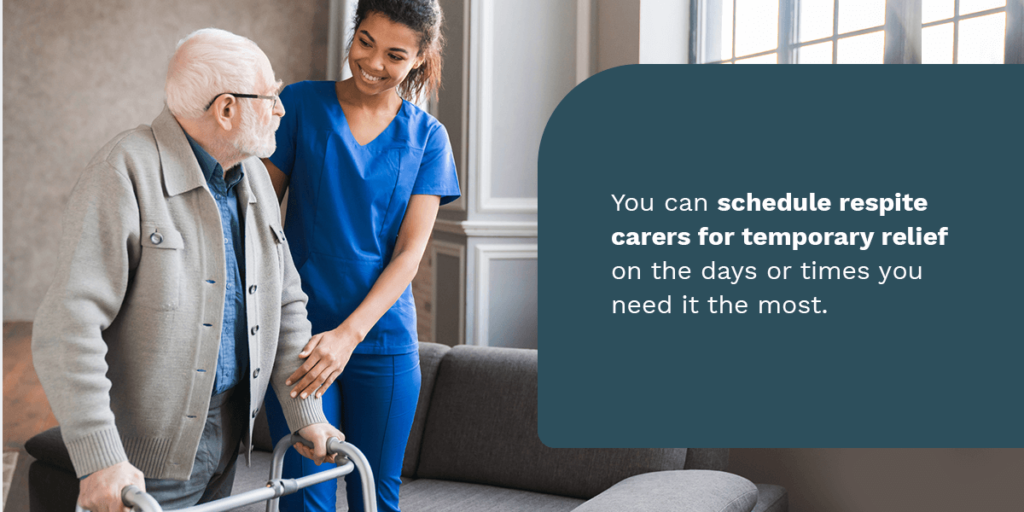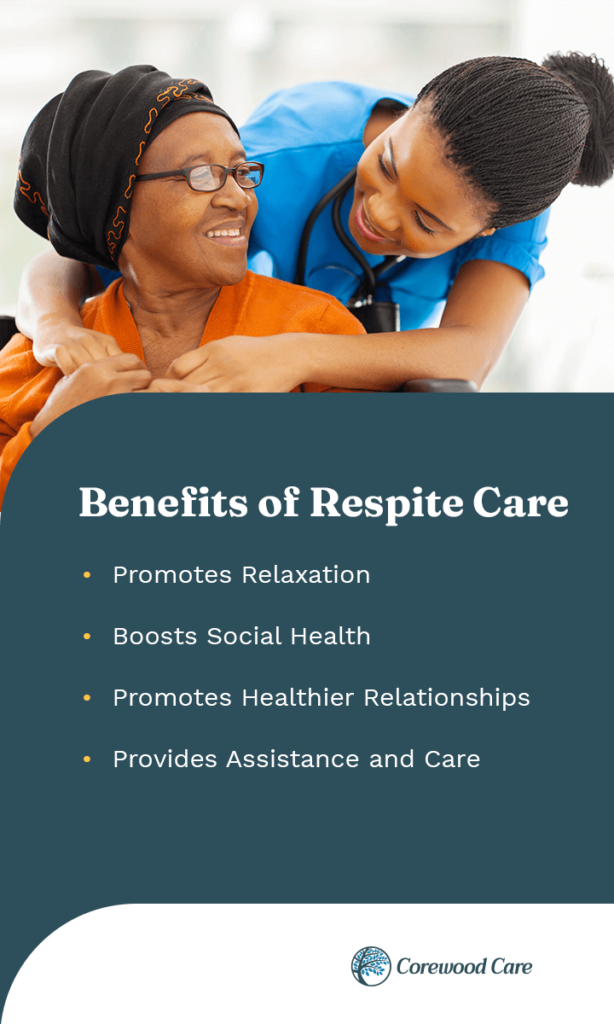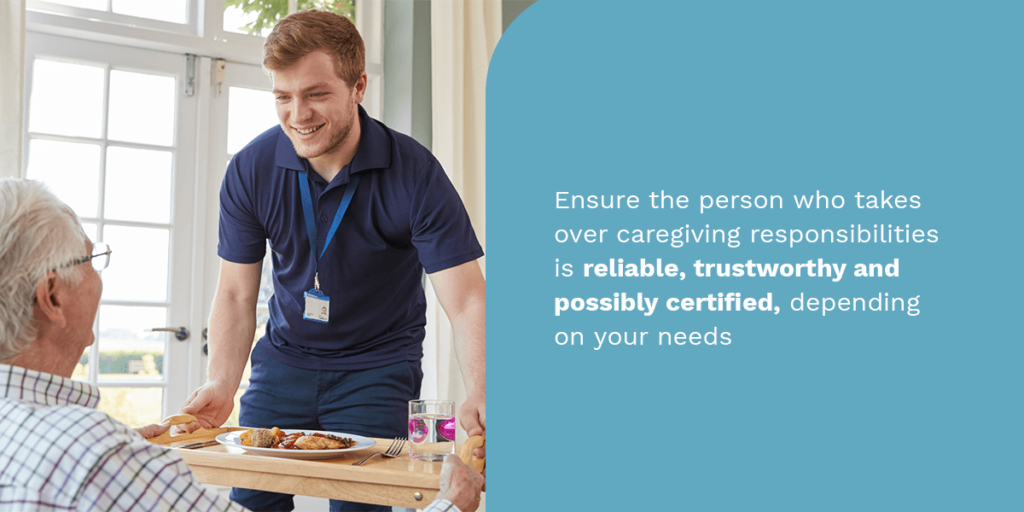What Is Respite Care?

Founder & CEO
Table of Contents
- What Respite Caregivers Do
- Types of Respite Care
- Benefits of Respite Care
- FAQs and Coverage
- Choosing a Respite Care Provider
With increased life expectancies and more people living with disabilities and chronic conditions today, many family members take on the role of primary caregiver to provide at-home care to family members. While providing care for a loved one or family member is a rewarding experience, it is easy to forget to take care of one’s self when they are a full time caregiver.
Primary caregivers may be family members, neighbors or friends who take over the caregiving responsibilities of another. Often, primary caregivers continue to juggle their own personal and professional responsibilities while caring for another. This in turn can lead to exhaustion, stress, isolation, guilt and ultimately, caregiver burnout.
Respite care offers primary caregivers short-term or temporary relief from their care responsibilities. This type of care will provide the primary caregiver with some downtime to rest and recharge. Let’s take a look at the benefits of respite care and how this could help you and your family member.
Respite caregivers can be family members, friends or other healthcare professionals who take over caregiving responsibilities. Caregiving presents its own sets of rewards and challenges. However, when you’re providing care every day for an extended period, you’ll need help carrying the weight. Learn the difference between respite care and home care, the benefits of respite assistance and how you can receive respite care for your family member.
What Do Respite Caregivers Do?
A 2020 study found that one in five Americans act as primary caregivers for family members. With an increasing number of older adults living longer, this number is expected to rise significantly. If you are a primary caregiver, respite care and respite care services temporarily assume your day-to-day caregiving duties and provide you with some rest and relief. Respite care can be provided in your home, adult day centers, assisted living communities or healthcare facility, giving you peace of mind while you take a much-needed break.
While typical home care services offer day-to-day support, on an ongoing basis, respite care/caregivers, provide this care for a temporary period. This may be for a few weeks, a few days or a few hours, it is up to the primary caregiver to decide what would be best for them and the person they are caring for. You can schedule respite caregivers for temporary relief on the days or times you need it the most.
Examples of respite care services include:
- ADL: Respite caregivers can assist with activities of daily living (ADL) for your family member who needs help eating, bathing or walking.
- IADL: They can assist with Instrumental activities of daily living (IADL) such as light housekeeping, meal preparation, driving to and from appointments during the time that you are away.
- Enrichment activities: If you care for a parent with dementia, respite caregivers can partake in stimulating activities, or if you have a disabled child, they can assist with physical therapy routines.
- Education: Most providers offer instruction and guidance when an older adult is transitioning through cognitive decline stages or when you have questions about specific health issues.
- Safety: Caregivers can be there in the home to offer you peace of mind that your family member is safe and can be there in case of any emergency.
Depending on the type of respite care you choose, providers and agencies offering respite care services can facilitate the areas you need help with the most, including, post-hospitalization, rehab or skilled nursing services.

Types of Respite Care
Ultimately, respite care will involve someone else providing care to your family member while you care for yourself. If you need someone to stop by while you run errands or hit the gym, for instance, a caregiver can provide respite services at your home.
In-Home Respite Care
Caregivers, professional or volunteers, can provide home respite care. Maybe you have to travel for business and need someone to stay at home, or you need someone to watch over your older parent at night to prevent them from wandering so you can get a good night’s rest, or you want to get to the gym, see a friend or continue a hobby that takes place a few hours during the day. You can schedule respite caregivers to be there for your loved one when you cannot physically be present at home.
- Volunteers: You can enlist volunteers from schools, churches or non-profit organizations for respite caregiving services.
- Home Care Agencies: Home-care agencies can provide temporary at-home services for your family members offering assistance with bathing, medication reminders, dressing as well as meal preparation, shopping and housekeeping duties.
- Temporary Stay at Assisted Living: Many communities offer temporary stays to older adults while their primary caregiver needs respite. They can enjoy the amenities, social activities and light personal care while you are away.
Out-of-Home Services
Depending on your location, respite caregivers can care for children, adults and seniors at private and non-profit facilities.
- Adult daycare: These centers are designed for adults who cannot manage independently or are isolated. Daycare centers plan activities to promote well-being by providing companionship and other activities during the week to improve social health.
- Residential programs: Group homes, assisted living communities and other facilities offer temporary accommodations to older adults.
- Caregiver retreats and respite camps: Education, peer support and other services are often available at these retreats, depending on your location. They’ll provide rest, relaxation and inspirational activities for rejuvenation before returning to caregiving responsibilities.

Benefits of Respite Care
Respite caregivers can ease the stress associated with taking care of your family member while you care for yourself. Whether it’s for a few days or a few weeks, respite assistance can give you the time to restore your energy and promote balance in your life. Learn about the benefits respite care can provide for you and your family member.
Promotes Relaxation
You’ll need help from time to time to take care of your own health to care for your family members. Respite care can alleviate the issues associated with taking care of others for an extended period, and it’s perfectly normal to enlist help at a time when you need relaxation.
A vacation or weekend away can prevent burnout during a long period of caregiving. When respite care ends, you’ll have the opportunity to return to your family member with a fresh mindset so that your caregiving role is more enjoyable for the both of you. Breaks can provide much-needed rest while restoring you with better focus to tackle any challenges.
Boosts Social Health
It’s essential to avoid isolation by keeping up with your relationships between friends and other family members. Solid relationships are vital for us as humans and promote the social engagement we need for our mental health. Taking a vacation with friends and meeting new people can help your overall mind and body, and you can reclaim your identity as more than a caretaker.
Promotes Healthier Relationships
Spending too much time with the person you care for can be detrimental to the relationship. Following the same schedule, having the same conversations or being cooped up in the same house for extended periods can create boredom or resentment. Respite care can help you take a break in your routine, have fun and establish a healthier relationship with the person you care for when you return.
Provides Assistance and Care
If you don’t have prior professional caregiving experience, respite caregivers can provide education and tips for caring for your family member. When you feel like you need support or the weight of caretaking responsibilities rests solely on your shoulders, respite care can offer you much relief when you aren’t sure what to do in a particular situation.
Severe health conditions might require special care that you don’t have the time or skills to provide. Respite caregivers can help you with bathing, meal prep and other small tasks that might prevent you from taking on your central role effectively.
How Long Can You Stay in Respite Care?
You define the amount of time your family member stays in respite care. Most people typically set a specific number of days, from a few hours to a few weeks. Respite care is generally reserved for short-term help when you need relief or help with taking care of your family member’s needs.
Studies show that primary family caregivers have a significant risk of developing anxiety, depression and overall burnout, with 40% to 70% experiencing depression.
Caregiving can feel like a full-time job when you’re caring for someone with severe health issues. Most family caregivers have no experience or proper guidance while taking care of a family member, and it can be taxing when you have no backup help or the proper breaks you need.
It’s logical to assume that you cannot provide all the assistance your family member needs or be by their side 24 hours, seven days a week. Respite care is necessary when you need a temporary break or if you’d like extra assistance while completing other caregiving or housekeeping tasks.
Many caregivers receive no support while providing intense care and going through health problems themselves. Even if you feel like you can handle all of the duties, you should take a break occasionally to avoid mental or physical strain.
Whether it’s for a day, a weekend or a couple of weeks, respite care can give you the break you need. If you’ve been missing your doctor’s appointments because you’ve had a packed schedule or you haven’t seen friends in a while, do what you need during this time — how much time and how you spend your respite care period is up to you.
Is Respite Care Covered by Medicare?
Respite services generally charge by the hour or number of days and weeks you need it. Often, insurance plans won’t cover these costs, so you’ll need to cover them.
If your family member qualifies for hospice care, Medicare will cover most of the cost of respite care. To qualify, a hospice doctor and a primary care doctor need to certify that your family member has a terminal illness and that they expect your family member to live no more than six months.
If Medicare approves your family member, they will cover the costs of room and board and care in a certified inpatient hospice facility for up to five days. You or your family member may have to pay for 5% of inpatient care costs. You can have one five-day respite period under each billing cycle.
Is Respite Care Covered by Medicaid?
Medicaid is different from Medicare in that it’s a federal program administered by individual states, so the rules for coverage will vary depending on your location. However, Medicaid’s Home & Community-Based Care Services (HCBS) program generally covers respite care.
Additionally, your family member might qualify for in-home care in a facility covered by Medicaid, depending on where you live.
To determine if your state offers respite care benefits, you can visit the HCBS program page and look for your state’s profile. Contact your state’s Medicaid agency to talk with someone who can answer your questions and help you cover respite care costs.

How to Choose a Respite Care Provider
If you’ve decided you need respite care, you’ll want to ensure the person who takes over caregiving responsibilities is reliable, trustworthy and possibly certified, depending on your needs. There are a few ways you can choose a respite care provider. These include:
- Friends and family: If your care includes light assistance or housekeeping, sometimes asking friends or family members to provide a watchful eye can give you the quick respite care you need.
- Agency: Connect with a home care agency to find providers who have the skills and tasks you need to meet your family member’s needs.
- Individual provider: You can look for a caregiver independently without paying for the fees an agency would require. However, you will need to conduct your own background and licensing checks and there is no nursing supervision or back-up support.
Keep an eye out for specific things to look for in the right respite care provider, including:
- Licensing: Make sure your potential provider has the necessary up-to-date licensing if your family member requires medical attention and they are insured and vetted.
- References: Make sure your caregiver prospect has reliable references before employing them for respite services. You’ll want to ask for references from past facilities or families they’ve worked with to get a good idea of how they work.
- Screening and evaluation: If you’re using an agency to find a provider, ask them how they screen and evaluate their caregivers to ensure you know their process and who you could be potentially working with.
- Reliability: Find someone who will be prompt and show up when you need them to. Ask questions in your interview process to ensure your potential carer is the right person for the job.
If you’re looking for your provider on your own, you’ll want to screen your prospects through an interview. Potential questions might be:
- What is your training and level of experience?
- How do you react in emergencies?
- What special skills do you have to make you a good fit for this role?
- If you cannot provide care on a specific day, do you have a backup plan?
- What services are included in your costs? How is payment arranged?
Learn more about Corewood Care’s Senior Home Care Services
We know how fulfilling it is to take care of those you love. We also understand how easy it is to forget to take care of yourself when you’re faced with the challenges of providing long-term care for someone.
Corewood Care specializes in-home care services specializing in respite care for elderly family members. Trust our dedicated team in Maryland, North Virginia, or Washington D.C. to support you and provide individual attention to your family members while you care for yourself.
Learn more about how our senior home care services can help you today.




